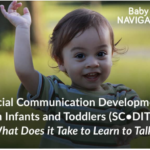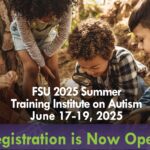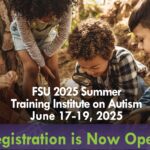Sensorimotor abnormalities and their neural mechanisms in autism spectrum disorder
We are currently seeking individuals aged 35-75 years with and without Autism Spectrum Disorder (ASD). We are interested in comparing behavioral and brain features in individuals with ASD and matched controls. Our study consists of different tests to measure motor skills, thinking abilities, and movement coordination. The brain imaging tasks are taken in an MRI scanner at the University of Florida. In addition, we will inquire about your medical history, daily life functioning, and family history during your visit. Testing takes place across one to two visits. Testing is voluntary and individuals would be compensated for their time and travel. Hotel/Motel accommodation is also available for special cases. Please contact the study team for detailed information at nbd.lab@phhp.ufl.edu or (352)-294-5309.
Children in Kindergarten – 3rd Grade with Developmental Disabilities
Children in Kindergarten – 3rd grade with developmental disabilities are invited to participate in a research project at Florida State University to study speech, language and reading development. Please see the attached flyer for more details on how you can participate.
Moral Decision-making among People on the Autism Spectrum
This study examines how people who self-identify as on the Autism spectrum make decisions in complex moral cases. The study is online, will take about a half hour to complete, and we will offer you $5 as a token of appreciation for contributing to the scientific record. The study is entirely voluntary and participants are free to refuse to answer any questions. Moral Decision-making among People on the Autism Spectrum.
Using visuals to increase the comprehension of science texts for young children with ASD
Elizabeth Jackson is a doctoral student at Florida State University majoring in Curriculum and Instruction with a focus on autism in relation to STEM fields. She is currently conducting a study involving science texts and reading comprehension. She is recruiting 5 to 7-year-old children that have been diagnosed with high functioning autism. Sessions will last approximately 20 minutes across an 8-12-week time period. A science book will be read aloud while asking 5 scripted questions. She will assess participants comprehension after each reading. She will come to you!
Cognitive Skills training for adolescents with Autism
Teaching Cognitive Skills Using 3D, Virtual-Simulation The purpose of this study is to design and evaluate a 3D, virtual-reality-based individualized program that teaches cognitive flexibility to adolescents with high-functioning autism. This program involves 8 online sessions of an online training program in which your child designs simulations/ games in a 3D virtual world. Each session is scheduled at a convenient time and lasts approximately 45 minutes. To participate, your child must be between the ages of 12 and 19, have an autism spectrum disorder, and receive grade level or above academic instruction. Your child will receive a $50 gift card at the end of the study. The study results will help the design and implementation of technology-integrated, engaging learning programs for adolescents with autism. Fengfeng Ke Email: fke@fsu.edu Phone: 850.644.8794 Associate Professor Educational Psychology and Learning Systems College of Education, Florida State University.
Do you have a child between 7-12 years of age who has high functioning autism spectrum disorder?
The KATLAB at Florida State University is looking for children ages 7-12 years who have been diagnosed with autism spectrum disorder (ASD). Participating children and their parents will be asked to play computer games while the researchers measure child and parent brain activity through EEG. The researchers will also ask participating families to complete questionnaires about their own and their child’s behaviors and emotions. Families will be paid for their participation. Please call (850) 692-8110 or email day@psy.fsu.edu & meyer@psy.fsu.edu if you wish to participate. A member of the KATLAB research team will complete screening with you over the phone to determine if your child is eligible to participate. You may be asked to come into the lab so that the research study team can confirm your child’s ASD diagnosis.
Does your child with autism get bothered by certain sounds?
Social Media: Do certain sounds bother your child? Does your child have autism? If so, we invite you to participate in a brief, 15-minute online survey click here investigating auditory sensitivity and its impact on anxiety and social activities. Coupon codes are available at the end of the survey for discounts to online retailers. This study is being conducted at Florida International University in the Department of Occupational Therapy. Participation in this survey is completely voluntary. Email: Dear Parents and Caregivers of Children with Autism, Does your child have difficulty tolerating certain sounds? If so, we invite you to participate in a brief online survey. Coupon codes are available at the end of the survey for discounts to online retailers. The purpose of this 15-minute survey is to learn more about auditory sensitivity and its impact on anxiety and social activities. This study is being conducted at Florida International University in the Department of Occupational Therapy. Participation in this survey is completely voluntary. To access the survey, please click here Thank you for your time and consideration! Sincerely, Tana Carson, PhD, OTR/L Assistant Professor Florida International University Phone: 305-348-9560 Email: AutismStudy@fiu.edu.
SPARK: Simons Foundation Power Autism Research for Knowledge, a national cohort of individuals and families affected by Autism Spectrum Disorder Protocol
If you or your child has a professional diagnosis of autism, UM-NSU CARD invites you to learn more about SPARK, a new online research study sponsored by the Simons Foundation Autism Research Initiative. The mission of SPARK is clear: speed up research and advance understanding of autism by creating the nation’s largest autism study. Joining SPARK is simple – register online and provide a DNA sample via a saliva collection kit in the comfort of your own home. Visit www.SPARKforAutism.org/card to register online or email us at SPARK@psy.miami.edu for more information. Together, we can help spark a better future for all individuals and families affected by autism.




